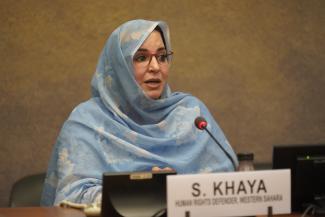
Geneva (Switzerland), December 11, 2024 (SPS) - During the commemorative event marking the 64th anniversary of the adoption of the historic UN Resolution 1514 (XV), which enshrines the principle of self-determination as a cornerstone of international law, the alarming situation in the occupied areas of Western Sahara was highlighted. In one of the main panels, serious human rights violations perpetrated in the region and the prevailing impunity under the Moroccan occupation regime were denounced.
Diplomats and international law experts emphasized the urgent need for the international community to activate effective mechanisms to protect the Saharawi population. Specific calls were made to the UN Security Council and other international bodies to take concrete actions to ensure the defense of human rights in the occupied territories.
In this context, the testimony of Saharawi activist Sultana Jaya gained special relevance. With a narrative filled with courage and determination, Jaya described the atrocities suffered by her and her family during her recent captivity. Among the abuses reported were multiple violations of human rights, physical assaults, threats, and acts of intimidation that illustrate the suffering faced by the Saharawi people under Moroccan occupation.
Sultana Jaya, internationally recognized as a symbol of the Saharawi resistance, recalled that she has faced the brutality of the occupation regime since her youth. In her address, she mentioned being repeatedly detained and how she lost one of her eyes following an attack by Moroccan security forces. However, she assured that these acts have not weakened her struggle; instead, they have reinforced her commitment to continue defending her people's rights until Western Sahara achieves independence and peace under the flag of the Saharawi Arab Democratic Republic (RASD).
With eloquence that moved the audience, Jaya called for urgent action, urging representatives of the international community to raise awareness about the grave situation of the Saharawi people and to pressure Morocco to end its occupation and human rights violations. She emphasized that adherence to international obligations is essential to ensure justice and dignity for the Saharawi people.
The event, framed within the resolution establishing the principles of self-determination and decolonization, was promoted by a group of friendly countries to Western Sahara in the UN Human Rights Council. It served as a reminder that the struggle for freedom and justice in Western Sahara remains an unfinished task. Sixty-four years after the adoption of Resolution 1514 (XV), the case of Western Sahara persists as one of the greatest challenges for the multilateral system and human rights.
Sultana Jaya's intervention and the strong denunciations made during the event underscored that the international community owes a debt to the Saharawi people.